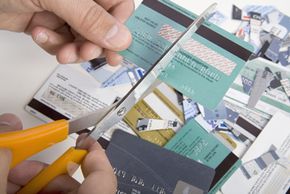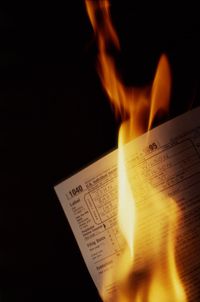Not paying your bills on time can affect your credit rating, plain and simple. There is little that people can do in life without credit, and even less if they have bad credit. Good credit is like a key. It's what allows you to get a loan from the bank for college, a new car or a new home. In many companies, it's customary to check the credit of prospective employees before they are hired as one check of their reliability. If you're a credit risk, you might be an employment risk as well.
If you've ever paid a bill late, you've probably noticed that you're charged a fine. If it's happened more than once with the same company, what you might not have noticed, or even known, is that in addition to the extra charge, your tardiness was reported to the credit bureau. Procedure varies from company to company, but as little as two late payments can result in a mark on your permanent financial record. If being slightly behind can tarnish your credit report, imagine what not paying your bills at all can do.
Advertisement
As soon as it's evident that you don't intend to pay your bill, the company will turn its information over to a collection agency -- this can be an outside agency or a division within the affected company. Once this happens, the collection agency will start by calling you. Agents will call you at home, at work, and even at a relative's house if they can locate the appropriate phone number. After the agent contacts you, if you still don't pay up, the collection agency can turn the matter over to the courts.
Fortunately for you, unless the agency has an adequate claim that you were fraudulent in some manner, it can't have you sent to jail immediately. Usually, a judgment will be granted and the collection agency, on behalf of the company to whom you owe money, will be able to do any or all of the following to recover the money:
- Garnish your salary (up to 50 percent)
- Seize personal property such as cars, boats or jewelry
- Place a lien on your bank account
Although regulations differ from state to state, the collection agency might even be able to seize your home. Most states have a homestead exemption, which allows people to maintain their property, if the property doesn't pass a certain value. But many of these values are only modest. If your home is valued beyond this allowance, you can be forced to vacate and your home will be sold to help pay your debt. At this point, even after you make amends and cover the full amount owed, this indiscretion will stay on your credit report for as many as seven or even 10 years.
Advertisement

